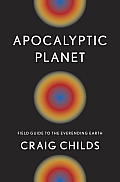
Writing
Apocalyptic Planet, I traveled to some of the most severe landscapes on earth. I relied on these places to tell the story of dramatic changes, revealing what this world is capable of. The first chapter was a multiweek foot trek across a sand-dune sea in Sonora, Mexico, in the heart of a seven-year drought. Along the way, my companion, Devin, and I came upon an abandoned ranch. I didn't actually write about the ranch in the book, but what we found there represents what this book is truly about: hope in the most despairing circumstances.
We walked for the bent metal windmill on the horizon, arriving to find a gate around the ranch closed with a loop of baling wire. Devin pried it off and opened enough space for us to step through. He turned to lash it closed. Inside, the ranch wasn't much, an old pozo, a well I imagined had dried up long ago. We entered a cluster of sand-pelted outbuildings, a clearing where you could have pulled in a few trucks and a trailer. Every wooden post was cornered with sand blown in from the dunes. Sleek and unstoppable, they leaned against windward shacks. No wind today, I had to imagine the windmill turning, its metal shaft squeaking bone-dry, no water in the ground to draw.
I poked through bunks where inhabitants had tidied things up before leaving; they had wrapped baling wire around a couple rolled mattresses. Workers must have moved up to a llantera on the crackled highway to the north or the glassy despair of los Vidrios, shaman Don Juan's old stomping grounds, where now you are more likely to see cartels launching volleys of bullets at each other. Or perhaps the people left for some more promising and far away place, maybe across the border into the U.S. North from here, they would have crossed what we call the Devil's Highway, the place where people die, usually from exposure. I hoped they made it.
A ratty fishing-net hammock hung between posts in the shade of a ramada, rodent-infested blanket wadded at one end. Behind it, I scooted open a door, pushing back dust inside where sunlight fell through wood slats. No need to shout "hello"; nobody was home. A couple of opened bean cans rested on the counter, paper labels hanging from them like brittle wings. Some cans were unopened and set back on shelves. Silverware stood in a dust-grimed cup. The people were not entirely gone. They had planned on coming back. I dug a fingernail into grease-blackened candle wax wondering when that might be. We'd found nothing but death around the ranch, corpses of leather-hided cows, and the long, slender-white bones of horses. Even a ranch dog had perished; a little sand dune was built up around it, its pelt burred and bleached by the sun.
Water was entirely gone from this place. The ancient bedrock tinajas that held rainwater in the surrounding volcanoes were empty. Life here was over.
Devin called from across the yard. He'd found something. I grunted back at him and walked through sunlight to where he stood on the concrete lip of the ranch's cistern, a shoulder-height wall next to the windmill. I imagined the cistern scabbed with long-dried algae, and maybe there would be some dead animal inside that caught Devin's savant-like attention. I climbed onto the wall and looked over to see the cistern nearly full of water.
I climbed to my feet awestruck, hadn't seen anything like this in a long time. The only water out here that we knew of was either carried on our backs or what we had cached out in the sand. The windmill had, indeed, been turning, its metal rod plumbing depths, pulling up a little stream and sending it into the cistern. Water bugs rowed beneath the surface, their shadows darting through algal depths. Call it an oasis if you want. Call it a miracle.
Devin fetched a metal pail with a wire handle. It was all we could do to keep from cannonballing into the cistern. We stripped clothes and pitched them aside. We dipped the bucket and carried it away one at a time to douse ourselves. One bucket each; weeks of sweat and grit poured off of us forming pools of mud at our feet. Even tepid, the water felt cool. Dancing naked and wet, we hooted and hollered and nobody heard us, our loudest voices like flies in the distance.